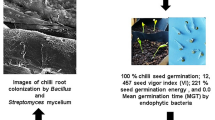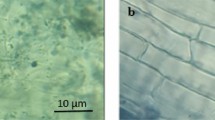Abstract
Phosphate solubilization, 1-aminocyclopropane-1-carboxylic acid (ACC)-deaminase activity and production of siderophores and indole acetic acid (IAA) are well-known traits of plant growth-promoting rhizobacteria (PGPR). Here we investigated the expression of these traits as affected by salinity for three PGPR strains (Pseudomonas fluorescens, Bacillus megaterium and Variovorax paradoxus) at two salinity levels [2 and 5 % NaCl (w/v)]. Among the three strains, growth of B. megaterium was the least affected by high salinity. However, P. fluorescens was the best strain for maintaining ACC-deaminase activity, siderophore and IAA production under stressed conditions. V. paradoxus was the least tolerant to salts and had minimal growth and low PGPR trait expression under salt stress. Results of experiment examining the impact of bacterial inoculation on cucumber growth at three salinity levels [1 (normal), 7 and 10 dS m−1] revealed that P. fluorescens also had good rhizosphere competence and was the most effective for alleviating the negative impacts of salinity on cucumber growth. The results suggest that in addition to screening the PGPR regarding their effect on growth under salinity, PGPR trait expression is also an important aspect that may be useful for selecting the most promising PGPR bacterial strains for improving plant tolerance to salinity stress.

Similar content being viewed by others
References
Ahmad M, Qamar I (2003) Productive rehabilitation and use of salt-affected land through afforestation (a review). Sci Vis 9:1–14
Ahmad M, Zahir ZA, Asghar HN, Asghar M (2011) Inducing salt tolerance in mung bean through co-inoculation with rhizobia and plant-growth-promoting rhizobacteria containing 1-aminocyclopropane-1-carboxylate-deaminase. Can J Microbiol 57:578–589
Ahmad M, Zahir ZA, Nadeem SM, Nazli F, Jamil M, Khalid M (2013) Field evaluation of Rhizobium and Pseudomonas strains to improve growth, nodulation and yield of mung bean under salt-affected conditions. Soil Environ 32:158–165
Anjum MA, Zahir ZA, Arshad M, Ashraf M (2011) Isolation and screening of rhizobia for auxin biosynthesis and growth promotion of mung bean (Vigna radiata L.) seedlings under axenic conditions. Soil Environ 30:18–26
Ashraf M, Hasnain S, Berge O (2006) Effect of exo-polysaccharides producing bacterial inoculation on growth of roots of wheat (Triticum aestivum L.) plants grown in a salt affected soil. Int J Environ Sci Technol 3:43–51
Baig KS, Arshad M, Khalid A, Hussain S, Abbas MN, Imran M (2014) Improving growth and yield of maize through bioinoculants carrying auxin production and phosphate solubilizing activity. Soil Environ 33:159–168
Belimov AA, Dodd IC, Safronova VI, Davies WJ (2009) ACC-deaminase-containing rhizobacteria improve vegetative development and yield of potato plants grown under water-limited conditions. Asp Appl Biol 98:163–169
Boiero L, Perrig D, Masciarelli O, Penna C, Cassan F, Luna V (2006) Phytohormone production by three strains of Bradyrhizobium japonicum, and possible physiological and technological implications. Appl Microbiol Biotechnol 74:874–880
Cassan F, Perrig D, Sgroy V, Masciarelli O, Penna C, Luna V (2009) Azospirillum brasilense Az39 and Bradyrhizobium japonicum E109, inoculated singly or in combination, promote seed germination and early seedling growth in corn (Zea mays L.) and soybean (Glycine max L.). Eur J Soil Biol 45:28–35
Dodd IC, Perez-Alfocea F (2012) Microbial alleviation of crop salinity. J Exp Bot 63:3415–3428
Egamberdieva D (2009) Alleviation of salt stress by plant growth regulators and IAA producing bacteria in wheat. Acta Physiol Plant 31:861–864
Glick BR (2014) Bacteria with ACC deaminase can promote plant growth and help to feed the world. Microbiol Res 169:30–39
Glick BR, Karaturovic DM, Newell PC (1995) A novel procedure for rapid isolation of plant growth promoting Pseudomonas. Can J Microbiol 41:533–536
Glick BR, Penrose DM, Li J (1998) A model for the lowering of plant ethylene concentrations by plant growth promoting rhizobacteria. J Theor Biol 190:63–68
Glick BR, Cheng Z, Czarny J, Cheng Z, Duan J (2007) Promotion of plant growth by ACC deaminase-producing soil bacteria. Eur J Plant Pathol 119:329–339
Hu Y, Schmidhalter U (2005) Drought and salinity: a comparison of their effects on mineral nutrition of plants. J Plant Nutr Soil Sci 168:541–549
Kerkar S, Raiker L, Tiwari A, Mayilraj S, Dastager S (2012) Biofilm associated indole acetic acid producing bacteria and their impact in the proliferation of biofilm mats in solar salterns. Biologia 67:454–460
Kloepper JW, Lifshitz R, Zablotowicz RM (1989) Free living bacterial inocula for enhancing crop productivity. Trends Biotechnol 7:39–44
Liu L, Guo G, Wang Z, Ji H, Mu F, Li X (2014) Auxin in plant growth and stress responses. In: Tran LSP, Pal S (eds) Phytohormones: a window to metabolism, signaling and biotechnological applications. Springer, New York, pp 1–35
Marulanda A, Barea JM, Azcon R (2009) Stimulation of plant growth and drought tolerance by native microorganisms (AM fungi and bacteria) from dry environments: mechanisms related to bacterial effectiveness. J Plant Growth Regul 28:115–124
Mattoo AK, Suttle CS (1991) The plant hormone ethylene. CRS Press, Boca Raton
Mayak S, Tirosh T, Glick BR (2004) Plant growth-promoting bacteria confer resistance in tomato plants to salt stress. Plant Physiol Biochem 42:565–572
Mehta S, Nautiyal CS (2001) An efficient method for qualitative screening of phosphate solubilizing bacteria. Curr Microbiol 43:57–58
Nadeem SM, Zahir ZA, Naveed M, Asghar HN, Arshad M (2010) Rhizobacteria capable of producing ACC-deaminase may mitigate salt stress in wheat. Soil Sci Soc Am J 74:533–542
Nadeem SM, Shaharoona B, Arshad M, Crowley DE (2012) Population density and functional diversity of plant growth promoting rhizobacteria associated with avocado trees in saline soils. Appl Soil Ecol 62:147–154
Nakbanpote W, Panitlurtumpai N, Sangdee A, Sakulpone N, Sirisom P, Pimthong A (2014) Salt-tolerant and plant growth-promoting bacteria isolated from Zn/Cd contaminated soil: identification and effect on rice under saline conditions. J Plant Interact 9:379–387
Nicolaus BL, Esposito LE, Manca MC, Improta R, Bellitti MR, Duckworth AW, Grant WD, Gambacorta A (1999) Haloarcula spp. able to bio-synthesize exo-endopolymers. J Ind Microbiol Biotechnol 23:489–496
Penrose DM, Glick BR (2003) Methods for isolating and characterizing ACC deaminase containing plant growth promoting rhizobacteria. Physiol Planta 118:10–15
Qurashi AW, Sabri AN (2012) Bacterial exopolysaccharides and biofilm formation stimulate chickpea growth and soil aggregation under salt stress. Braz J Microbiol 43:1183–1191
Saharan BS, Nehra V (2011) Plant growth promoting rhizobacteria: a critical review. Life Sci Med Res 21:1–30
Sandhya V, Ali SKZ, Grover M, Reddy G, Venkateswarlu B (2009) Alleviation of drought stress effects in sunflower seedlings by the exopolysaccharides producing Pseudomonas putida strain GAP-P45. Biol Fertil Soils 46:17–26
Sarwar M, Arshad M, Martens DA, Frankenberger WT Jr (1992) Tryptophan dependent biosynthesis of auxins in soil. Plant Soil 147:207–215
Schwyn B, Neilands JB (1987) Universal chemical assay for the detection and determination of siderophores. Anal Biochem 160:47–56
Shaharoona B, Imran M, Arshad M, Khalid A (2011) Manipulation of ethylene synthesis in roots through bacterial ACC deaminase for improving nodulation in legumes. Crit Rev Plant Sci 30:279–291
Siddikee MA, Chauhan PS, Sa T (2012) Regulation of ethylene biosynthesis under salt stress in red pepper (Capsicum annuum L.) by 1-aminocyclopropane-1-carboxylic acid (ACC) deaminase-producing halotolerant bacteria. J Plant Growth Regul 31:265–272
Stefan M, Munteanu N, Stoleru V, Mihasan M (2013) Effects of inoculation with plant growth promoting rhizobacteria on photosynthesis, antioxidant status and yield of runner bean. Romanian Biotechnol Lett 18:8132–8143
Tank N, Saraf M (2010) Salinity-resistant plant growth promoting rhizobacteria ameliorates sodium chloride stress on tomato plants. J Plant Interact 5:51–58
Tavakkoli E, Fatehi F, Coventry S, Rengasamy P, McDonald GK (2011) Additive effects of Na+ and Cl− ions on barley growth under salinity stress. J Exp Bot 62:2189–2203
Upadhyay SK, Singh JS, Singh DP (2011) Exopolysaccharide-producing plant growth promoting rhizobacteria under salinity condition. Pedosphere 21:214–222
Zahir ZA, Arshad M, Frankenberger WT Jr (2004) Plant growth promoting rhizobacteria application and perspectives in agriculture. Adv Agron 81:96–168
Zahir ZA, Ghani U, Naveed M, Nadeem SM, Asghar HN (2009) Comparative effectiveness of Pseudomonas and Serratia sp. containing ACC deaminase for improving growth and yield of wheat (Triticum aestivum L.) under salt-stressed conditions. Arch Microbiol 191:415–424
Zhang JL, Flowers TJ, Wang SM (2010) Mechanisms of sodium uptake by roots of higher plants. Plant Soil 326:45–60
Acknowledgments
The authors gratefully acknowledge the Higher Education Commission (HEC) of Pakistan for the financial support for this research. The authors also gratefully acknowledge support provided by the Kearney Foundation of Soil Science, USA.
Author information
Authors and Affiliations
Corresponding author
Additional information
Communicated by Erko Stackebrandt.
Rights and permissions
About this article
Cite this article
Nadeem, S.M., Ahmad, M., Naveed, M. et al. Relationship between in vitro characterization and comparative efficacy of plant growth-promoting rhizobacteria for improving cucumber salt tolerance. Arch Microbiol 198, 379–387 (2016). https://doi.org/10.1007/s00203-016-1197-5
Received:
Revised:
Accepted:
Published:
Issue Date:
DOI: https://doi.org/10.1007/s00203-016-1197-5




